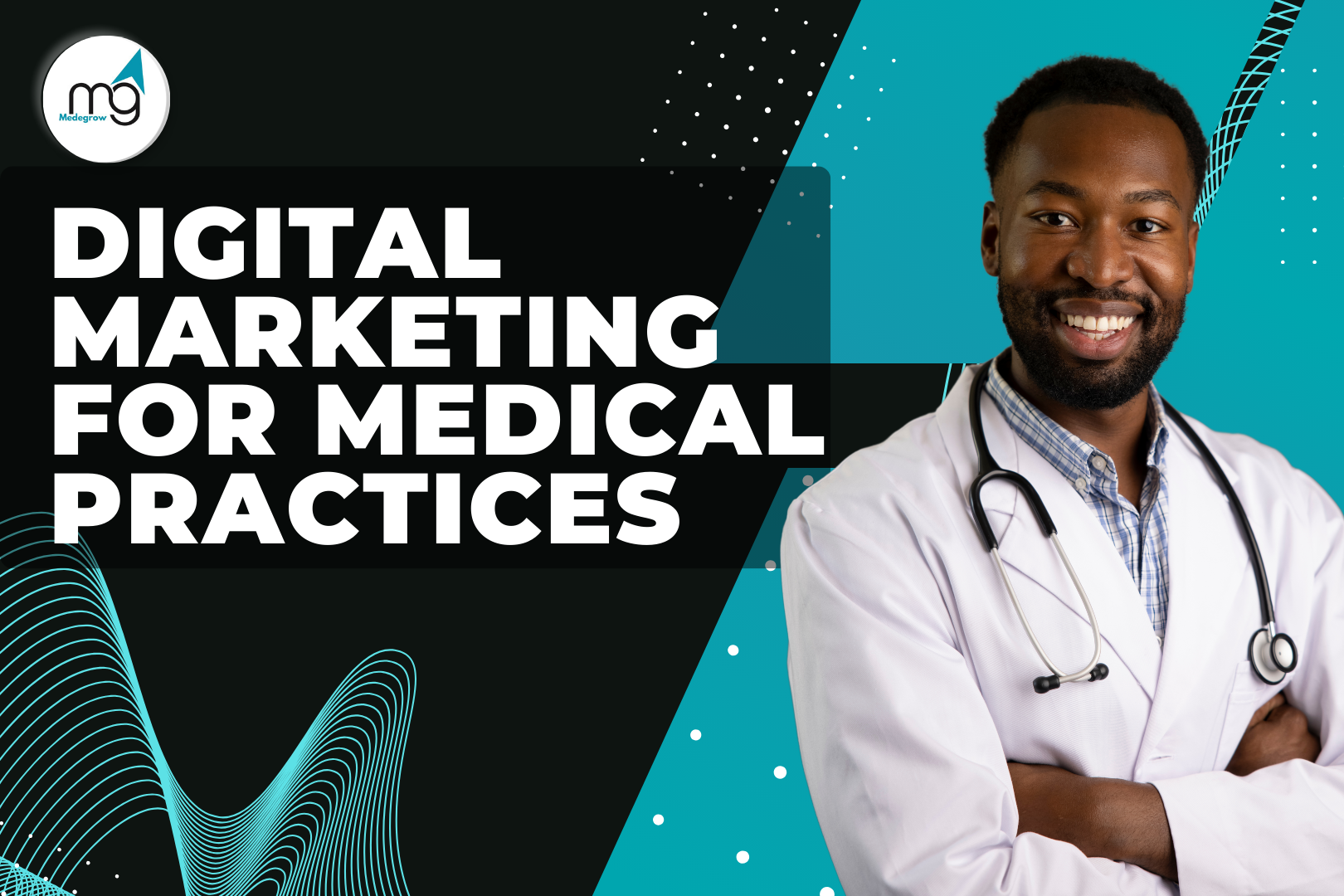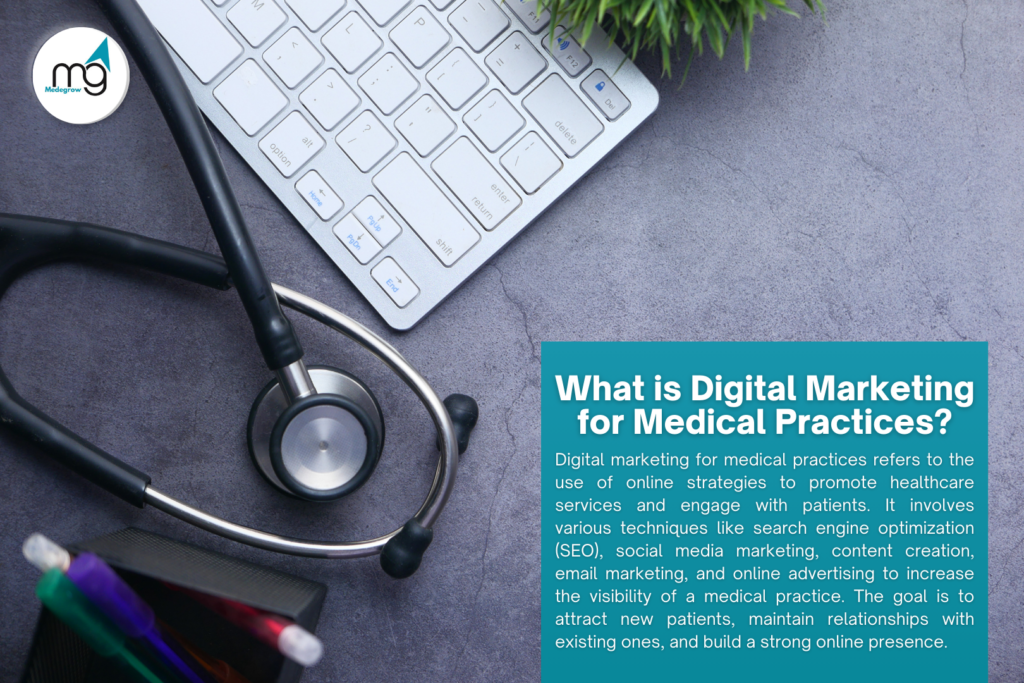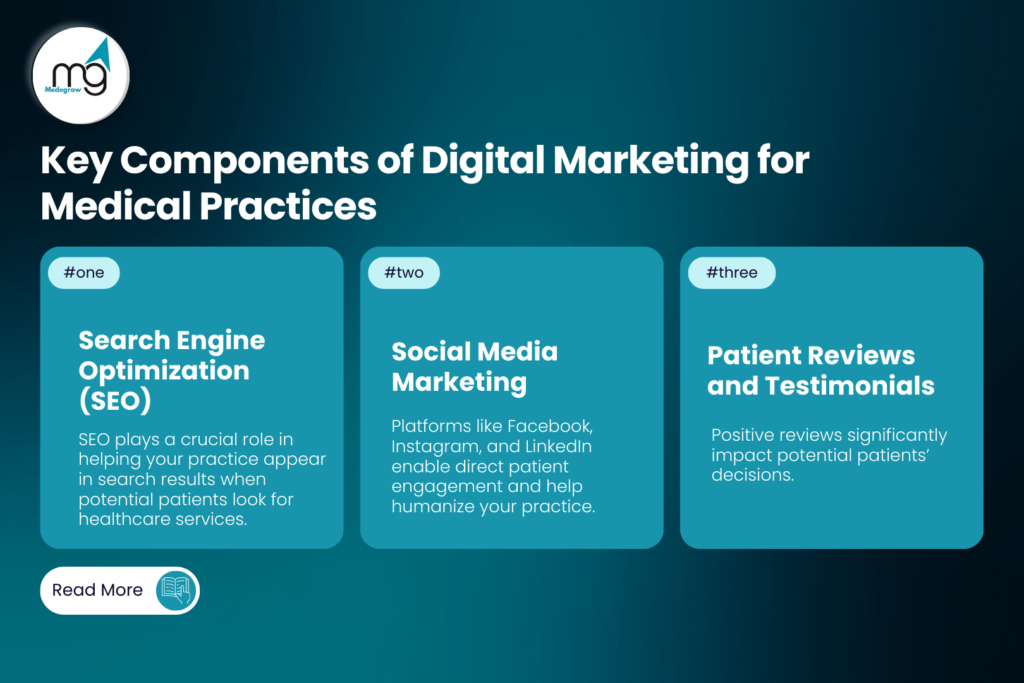
In today’s competitive healthcare landscape, digital marketing for medical practices has shifted from being an optional tactic to an essential strategy for attracting and retaining patients.
The digital age has revolutionized how people seek healthcare services, with patients increasingly relying on online research, reviews, and educational content to make informed decisions about their providers.
Digital marketing for medical practices serves as the bridge connecting patient needs with your healthcare services. It enables you to create a robust online presence, build trust with potential and existing patients, and foster lasting relationships.
Whether managing a small clinic or a large healthcare facility, implementing effective marketing strategies not only enhances visibility but also helps establish your authority in the healthcare industry. A strong marketing plan is a cornerstone for sustaining and growing any medical practice in the digital age.
What is Digital Marketing for Medical Practices?
Digital marketing for medical practices refers to a range of strategies and techniques designed to promote healthcare services, enhance patient engagement, and attract new patients. This approach leverages online platforms and tools to connect with patients, educate them, and highlight your expertise.

Traditional methods, such as direct mail and local community events, focus on broad outreach. In contrast, digital marketing takes a more targeted approach, using platforms like social media, search engines, and email campaigns to deliver personalized and timely messages.
The primary goals of digital marketing are twofold: patient acquisition and retention. While attracting new patients ensures growth, retention strategies help maintain a loyal patient base by staying top-of-mind and continuously meeting their needs.
This dual focus underscores the importance of integrating digital marketing into any medical practice’s strategy.
Key Components of Digital Marketing for Medical Practices
Professional Online Presence
A well-designed and professional website forms the foundation of digital marketing for medical practices. Your website should act as a virtual front door for your practice, welcoming visitors and guiding them to the information they need. Essential elements include:

Search Engine Optimization (SEO)
Local SEO plays a crucial role in helping your practice appear in search results when potential patients look for healthcare services in their area. Key tactics include:
Social Media Marketing
Platforms like Facebook, Instagram, and LinkedIn enable direct patient engagement and help humanize your practice. Effective strategies include:
Content Marketing
High-value content is at the heart of digital marketing. By creating blogs, videos, and newsletters, you can educate patients about preventive care, treatment options, and healthcare trends. Examples include:
Patient Reviews and Testimonials
Positive reviews significantly impact potential patients’ decisions. Encouraging satisfied patients to leave reviews on platforms like Google, Healthgrades, and Yelp enhances credibility. Responding to reviews—both positive and negative—shows that you value feedback and prioritize patient satisfaction.
Get a Free Consultation
Ready to elevate your practice? Contact us today for personalized digital marketing for medical practices solutions designed to help you grow and thrive.
Strategies for Effective Digital Marketing for Medical Practices
Understand Your Audience
Analyze patient demographics, preferences, and behaviors to create tailored marketing campaigns. Understanding your audience ensures your messaging resonates and meets their specific needs.
Use Paid Advertising
Paid advertising on platforms like Google Ads, Facebook, and Instagram amplifies your reach. These ads allow precise targeting based on location, age, gender, and healthcare needs, ensuring you attract the right patients.
Also, check out our other blog on PPC for Doctors – learn how pay-per-click advertising can help doctors reach more patients and expand their practice!

Utilize Community Engagement
Hosting health fairs, workshops, and webinars not only educates the public but also positions your practice as a trusted healthcare provider in the community.
Promote Telemedicine Services
Highlighting the convenience and accessibility of telemedicine is essential in today’s healthcare landscape. Use campaigns to emphasize its benefits, especially for patients in remote or underserved areas.
Optimize for Mobile Users
With the majority of patients searching for healthcare services on their smartphones, a mobile-responsive website is crucial. Ensure seamless navigation, fast load times, and intuitive design.

Benefits of Digital Marketing for Medical Practices
Increased Patient Base
Strategic marketing efforts attract new patients, helping grow your practice beyond its traditional reach.
Enhanced Patient Engagement
Regular communication through emails, newsletters, and social media fosters a stronger connection with patients, encouraging loyalty.
Higher Visibility
SEO, social media, and targeted ads ensure your practice stands out in a crowded market, making it easier for patients to find you.

Strengthened Credibility
Sharing educational content and showcasing positive reviews builds trust, positioning your practice as a reliable healthcare provider.
Improved Revenue
By expanding your patient base and enhancing engagement, digital marketing for medical practices directly contributes to increased revenue.
Challenges in Digital Marketing for Medical Practices
Regulatory Compliance
Adhering to healthcare regulations, such as HIPAA, is vital. All marketing materials must protect patient confidentiality and follow industry standards.
Balancing Professionalism and Approachability
Content must strike the right tone, remaining professional while being relatable and accessible to patients.
Limited Resources
Smaller practices may face time and budget constraints. Partnering with marketing experts can help maximize resources.

Tools and Technologies for Digital Marketing
Case Studies and Success Stories
Tips for Getting Started

Conclusion Of Digital marketing for medical practices
Digital marketing for medical practices is no longer optional—it’s the cornerstone of a successful healthcare business. By leveraging modern tools, creating patient-focused campaigns, and maintaining a professional yet approachable presence, your practice can attract new patients, retain existing ones, and position itself for long-term growth.
FAQs: Digital Marketing for Medical Practices
What is digital marketing for medical practices?
Digital marketing for medical practices involves using online strategies like SEO, social media, and email campaigns to attract, engage, and retain patients.
Why is digital marketing for medical practices important?
It helps practices improve online visibility, build trust with patients, and drive growth in a competitive healthcare market.
How does SEO benefit medical practices?
SEO ensures your website ranks higher in search results, increasing visibility and attracting more patient inquiries.
What role does social media play in digital marketing for medical practices?
Social media allows practices to connect with patients, share updates, and promote services in an engaging and interactive way.
How can content marketing help my practice?
Educational blogs, videos, and newsletters position your practice as an authority, answering patient questions and building trust.


